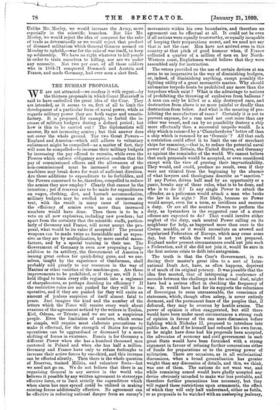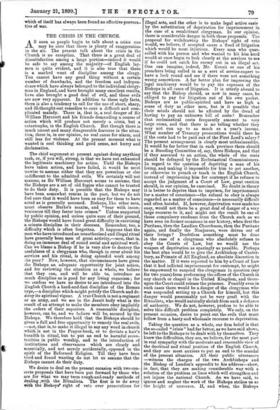THE RUSSIAN PROPOSALS.
WE are not attracted—we confess it with regret—by the thirteen proposals in which Count Muravieff is said to have embodied the great idea of the Czar. They are intended, as it seems to us, first of all to limit the development of a particular form of naval power, while as regards military power they are both vague and unsatis- factory. It is proposed, for example, to forbid the in- crease of military budgets during a defined period; but how is this to be carried out ? The diplomatists will answer, By not increasing armies ; but that answer does not cover the whole ground. The two Great Powers— England and America—which still adhere to voluntary enlistment might be compelled—as a matter of fact, they will soon be compelled—to increase their military budgets by increasing the pay offered to recruits, while even the Powers which enforce obligatory service confess that the pay of commissioned officers and the allowances of the non-commissioned must be increased or their great machines may break down for want of sufficient direction. Are those additions to expenditure to be forbidden, and the Powers concerned to be, therefore, compelled to reduce the armies they now employ ? Clearly that cannot be the intention ; yet if reserves aro to be made for expenditures on wages, clothing, diet, and barrack accommodation, military budgets may be swelled to an enormous ex- tent, with the result in many cases of increasing the efficiency of armies even more than increased numbers would have done. Then there is to be a veto on all new explosives, including new powders; but apart from the certainty that the scientific staffs, particu- larly of Germany and France, will never accept the pro- posal, what would be its value if accepted ? The present weapons can be made twice as formidable and as expen- sive as they are by multiplication, by more careful manu- facture, and by a special training in their use. The Government of Germany is even now proposing a large addition to its artillery, the Government of America is issuing great orders for quick-firing guns, and we our- selves, taught by the experience of Omdurman, shall probably add greatly to our resources in the way of Maxims or other varieties of the machine-gun. Are those improvements to be prohibited, or if they are, will it be held illegal to train every rifle regiment into a regiment of sharpshooters, so perhaps doubling its efficiency ? If the restrictive rules are not pushed far they will be in- operative, and if they are pushed far they will excite an amount of jealous suspicion of itself almost fatal to peace. Just imagine the kind and the number of the letters which the Times will receive every week about evasions of the agreement noticed by the writers in Toulon, Kid, Odessa, or Trieste ; and we are not a suspicious people. Even the limitation of numbers, which seems so simple, will require most elaborate precautions to make it effectual, for the strength of States for special operations can be aggrandised or decreased by a mere shifting of forces in existence. Russia is for Germany a different Power when she has a hundred thousand men cantoned in Poland and when she has half a million. Germany and France have only to refuse furloughs to increase their active forces by one-third, and this increase can be effected silently. Then there is the whole question of Reserves, trained Militia, and volunteer fleets—but we need not go on. We do not believe that there is an organising General in any service in the world who believes it possible by any written agreement to stereotype effective force, or to limit strictly the expenditure which when alarm has once spread could be utilised in making existing forces additionally effective. No agreement can be effective in reducing national danger from an enemy's movements within his own boundaries, and therefore no agreement can be effectual at all. It could not be even if all nations were equally trustworthy, or equally incapable of keeping their preparations secret, and we need not say that is not the case. Men have not arrived even in this country at that pitch of good humour when, if France collected a quarter of a million of men on her North- Western coast, Englishmen would believe that they were assembled only for instruction.
The vetoes provided on the use of certain devices at sea seem to us inoperative in the way of diminishing budgets, or, indeed, of diminishing anything, except possibly the fighting utility of a great mercantile marine. Why should submarine torpedo boats be prohibited any more than the torpedoes which exist ? What is the advantage to nations of prohibiting the throwing of explosives from balloons ? A man can only be killed or a ship destroyed once, and destruction from above is no more painful or deadly than destruction from below. And what is the meaning of pro- hibiting the manufacture of rams ? Certainly it is not to prevent expense, for a ram need not cost more than any other war vessel, and can by no possibility destroy a ship more effectually than a successful torpedo would. Is a ship which is rammed by a' Clampherdown ' better off than a ship which is rammed by an 'Oceanic ' ? All that such a restriction could effect is to limit the use of merchant ships for ramming,—that is, to reduce the potential naval power of Great Britain, the United States, and Germany as against the remainder of the world. We cannot believe that such proposals would be accepted, or even considered except with the view of proving their impracticability. They would, and could, produce no result, even if they were not vitiated from the beginning by the absence of what lawyers and theologians describe as " sanction." If any Power, driven half mad by an opportunity or a panic, breaks any of these rules, what is to be done, and who is to do it ? Is any single Power to attack the offender, as a policeman would attack a man who broke the law in his sight ? Not likely, because no Power would accept, even for a term, so invidious and onerous a, duty. Or are all the neutral Powers to perform the duty, as bystanders in the suggested case of a street offence are expected to do? That would involve either neglect of the duty, each neutral Power calling on its neighbour for help, as happened more than once in the Cretan muddle, or it would necessitate an avowed and regularised Federation of Europe, which may come some day, but for which the world is not yet prepared. England under present circumstances could not join such a Federation, and if she did not join it, would be sure in the first serious crisis to drift into antagonism.
The truth is that the Czar's Government, in re- ducing their master's great idea to a sort of Inter- national Draft Act, have, as often happens, deprived it of much of its original potency. It was possible that the idea first mooted, that of interposing a conference of seconds between the challenge and the actual duel, might have had a serious effect in checking the frequency of war. It would have had for its supports the reluctance of Sovereigns to seem unreasonable, the conscience of statesmen, which, though often asleep, is never entirely dormant, and the permanent fears of the peoples that, if defeated, they may be overrun by hostile armies. The power of opinion is often exaggerated, but still there would have been under most circumstances a strong rush of opinion in favour of the one more discussion before fighting which Nicholas IL proposed to introduce into public law. And if he himself had reduced his own forces, as he might have done had his proposals been accepted, the advocates of economy and civil government in each great State would have been furnished with a strong argument in favour of refusing further concessions either of funds for preparations or to the growing power of militarism. There are occasions, as in all ecclesiastical discussions, when a broad generalisation has greater weight than any discussion of details, and this, we think, was one of them. The nations do not want war, and while remaining armed would have gladly accepted any device obviously intended to make war less probable, and therefore further precautions less necessary, but they will regard these restrictions upon armaments, the effect of which they will only half understand, either as futile, or as proposals to be watched with an unsleeping jealousy, which of itself has always been found an effective provoca- tive of war.



































 Previous page
Previous page